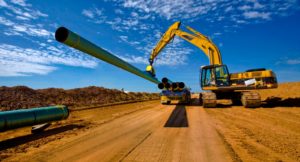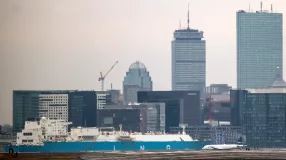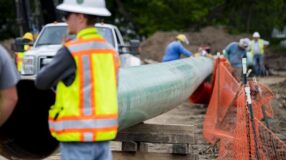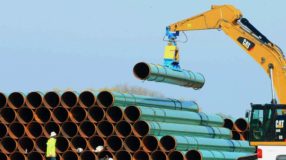
The following is a contributed article by Amy Andryszak, president & CEO of the Interstate Natural Gas Association of America.
Over the past two months, the Biden administration has called on domestic natural gas companies to ramp-up production to assist our allies in Europe through increased exports of liquefied natural gas, or LNG. But missing from the conversation is approving infrastructure that will safely transport that additional supply from where it is produced to export facilities. Put simply, we must expand our natural gas transmission system to accommodate increased production. This increase in infrastructure capacity will require an honest evaluation of the permitting challenges currently plaguing natural gas infrastructure development in our nation.
While he was on the campaign trail, INGAA was encouraged by then-candidate Biden’s remarks about the strategic importance of natural gas. We believed President Biden understood that natural gas and its related infrastructure could help his administration achieve its climate goals by reducing CO2 emissions and enabling the greater adoption of renewable energy sources, all while providing a reliable and affordable choice to meet our country’s expanding energy needs.
Unfortunately, decisions and rhetoric from federal agencies over the last 16 months tell the story of an administration that does not appear to value natural gas. Their actions have indicated that the administration is seeking to use regulatory and permitting mechanisms to transition our domestic energy portfolio away from natural gas, instead of capitalizing on the natural resources available here at home that are necessary to meeting our nation’s climate goals and assisting our allies overseas.
Consider the following.
The Federal Energy Regulatory Commission’s track record is just one of many proof points of the already difficult and lengthy process to build infrastructure in this country. From June 2021 until March 2022, FERC did not approve any major natural gas projects. Since then, FERC has approved six, but there are still 8 major natural gas projects pending approval before the commission with the combined potential to provide more than 11.3 million cubic feet of natural gas per day in additional capacity. Without this additional transportation capacity, some of the additional gas supply policymakers are calling on developers to produce may not reach American consumers or LNG terminals.

In addition to this project backlog, FERC recently introduced updates to its 1999 certificate policy statements that will make it more difficult to build the required infrastructure to get additional production to market. These revisions marked a striking departure from the Commission’s historical, congressionally authorized role as a fundamentally economic regulator, and instead charted a new path as a de facto climate regulator for the entire natural-gas sector — from the wellhead where it’s produced to the burner tip, manufacturing facility or export terminal for end use.
This is the type of regulatory action that has the potential to severely disrupt the permitting process and prevent the development of much-needed, job-creating infrastructure. FERC has an opportunity to revise these draft proposals to meet the policy objectives outlined by the Biden administration, which calls for added production of domestic natural gas resources.
In addition to what’s happening at FERC, we are also seeing aggressive regulatory activity from the Army Corps of Engineers, Council for Environmental Quality, Environmental Protection Agency and Securities and Exchange Commission that all have the potential to further impede the permitting process. These policy changes will also have a dramatic — and negative — impact on the investments necessary to build additional energy infrastructure in our country.
In short, the Biden administration’s words and their policy actions are telling two different stories. While the President has recently shifted his narrative to support American natural gas, his administration continues to introduce and implement policy that impacts our industry through added delays and costs. Though his messaging may be encouraging, the actions tell a different story. Rhetoric must match reality.
INGAA strongly encourages the Biden administration to signal to markets and their own federal agencies that they value the strategic importance of natural gas in helping achieve our nation’s security goals, and also our climate goals. Now is not the time to be throwing up additional regulatory roadblocks. Rather, permitting agencies like FERC need to take action today by moving pending projects forward. By doing so, we can ensure the reliable transport of natural gas necessary to meet our country’s energy and climate goals both at home and abroad.







